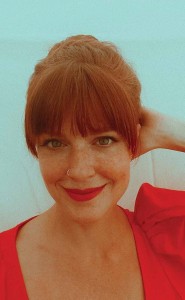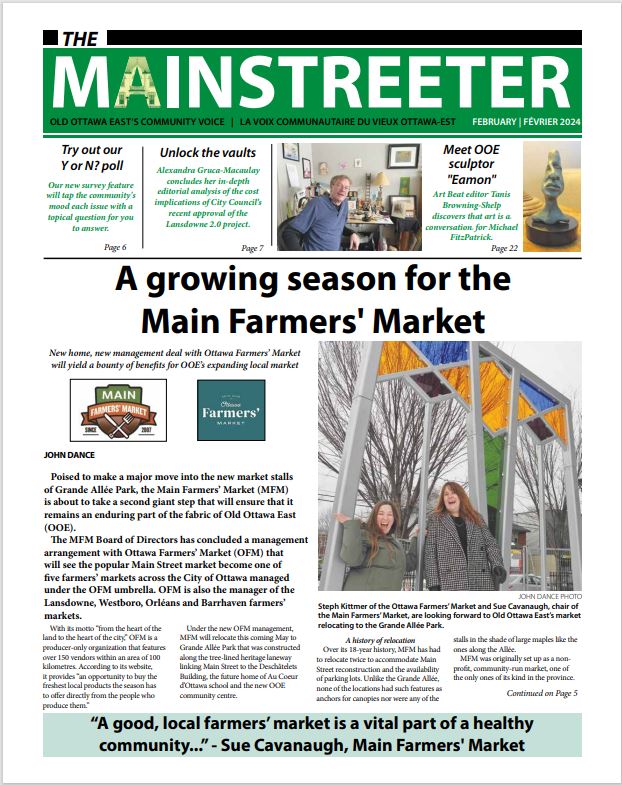Mainstreeter Staff
Performing was always my comfort – it’s where I
feel most at home…”
We continue our popular interview feature this issue, focusing on a gifted young talent from the world of opera, Wallis Giunta, who grew up and began to hone her world-renowned classical music and performance skills while living with her parents and siblings on Marlowe Street in Old Ottawa East, and before that in Old Ottawa South. Among her many accomplishments, the mezzo soprano who has trained with both the Canadian Opera Company (COC) in Toronto and the Metropolitan Opera in New York, and has performed with opera companies around the world, was named “Young Artist of the Year” at the 2018 International Opera Awards.
Described recently as ‘the real deal” and “a transcendental talent” in influential music publications, Wallis took time during the pandemic to talk to The Mainstreeter and reflect on her roots in our community. In this interview, conducted from her home in Leeds, England, she recalls her childhood and adolescence in Ottawa, discusses the dedication and passion for singing that has brought her international success, and speaks with her characteristic frankness about the important work she is doing offstage, using her social media platform to influence change and betterment within the opera world.
THE MAINSTREETER: Wallis, you grew up in Old Ottawa South, and then moved to Old Ottawa East as a teenager. Music obviously was a key to your childhood. But what other interests did you have as a youngster and what else did you enjoy doing beyond the realm of music and singing?
GIUNTA: I was a really outgoing, very busy, active kid. We grew up next to Brewer Park, across the street from the Ottawa Tennis and Lawn Bowling Club. My sister and I were over there almost every day. We were actually competitive junior lawn bowlers. They started this program when we were kids for junior members; they were trying to encourage kids to pick up lawn bowling because, up until then, the average member age was probably over 65. So, we were there almost every day in summer, and with our parents’ encouragement we ended up loving it. We both did it for about seven years, until around age 15.
Our parents made a choice for us to grow up in a home without television; at some point we got a TV, but we had just basic cable, and a few VHS movies that we would get to watch if we were good! We were hardly ever in front of screens, but we did spend a ton of time building with our Dad’s childhood LEGO collection! Since we didn’t watch television, we never saw commercials and we didn’t know about all the trendy plastic toys that everybody was getting – we were pretty oblivious to whatever was on the market. I’m super grateful for that, and I know my parents did the right thing.
For me, childhood was full of imaginative play. Anytime it wasn’t miserable weather, I was outside. I was down by the river, chasing toads or snakes or building forts in the trees with my sister. We were super outdoorsy and active, always climbing on the play structures at Brewer Park. For my sister and I, and my brother when he came along a little later, we would play creatively with whatever we found – we would go out in the backyard and we’d use clay pots, a trowel and some garden hose and we’d build a bakery or something, and play all day selling each other mud pies. It was just that kind of childhood, and I know we were really lucky to have that.
I was also an avid reader. That’s the other thing I suppose that comes from no television. I absorbed books like a plant in the desert in a rainstorm. I really loved Sherlock Holmes. I think I used my first bit of allowance money to buy an annotated compendium of the complete works of Sir Arthur Conan Doyle when I was about 11! I’ve got to chuckle at that.
THE MAINSTREETER: I had a report from a neighbour who was also a member of the Ottawa Tennis and Lawn Bowling Club that you were occasionally spotted around the pool.
GIUNTA: Not occasionally, probably eight hours a day! We lived in the water, my sister and I. We had a membership there as a family, and whenever we weren’t lawn bowling, we were in the pool. It was ideal for my parents to have a place like that which they could take us just a stone’s throw from home, with all our friends and a great community of families every day. I loved swimming and still do, and even ended up becoming a lifeguard at our family camp, Red Pine Camp, in my teens.
THE MAINSTREETER: I understand that, as a teenager in Ottawa, your commitment to singing was ironclad, and that commitment really had some impacts on you during your adolescent years and as you trained for your professional career.
GIUNTA: I think it had a really big
impact. The single-mindedness that I had for my musical training growing up went a long way to preparing me for the next step of studying singing at the university level and attending professional training programs at the Canadian Opera Company (COC) and the Metropolitan Opera. I went straight into the COC program in Toronto when I finished my post-secondary training, at age 23. That’s fairly young to be singing at an opera house of that level, but they were great about only involving me in shows that were appropriate for such a young singer. And I felt well prepared for the challenge having been singing since I was a kid! It was a wonderful place to grow as a young artist. After two years there, I went directly to the Met in New York to join their training program. The Met is a much bigger opera house, so I had to be even more careful about pacing myself. The operatic voice can’t really be rushed – it takes the time it takes to develop. I had an advantage over a lot of my peers in post-secondary training and in my early career because I’d started so young and had been fully immersed in musical and dramatic training from age 5.
I think that making sacrifices for my chosen art form as a young person was the best thing I could have done to set myself up for the career that I now have. There were a lot of parties I couldn’t go to in high school, because I had to do a singing lesson the next day or some important performance with my choir, or a show for the Orpheus Musical Theatre Society. I was aware at the time that I was missing out on certain things, but I never really wanted to take my foot off the pedal. And I sought out every single opportunity I could growing up in Ottawa to be involved in the arts, music and performing. I’m grateful that I started early, with a slow and steady journey, and even more grateful to my parents for supporting me in everything that I wanted to do.
THE MAINSTREETER: Wallis, you’ve had so much experience singing in front of people from a very early age, and you seem absolutely fearless. For most of us, using our singing voice in public is a daunting prospect. I wonder whether fear has been a motivator for you, or whether it has in any way been an inhibiting factor?
GIUNTA: I haven’t actually experienced that fear that I think some people would have, had they been in my position. I remember reading once that the average person would rank fear of public speaking over fear of death! The joke being that if they had to be at a funeral they’d rather be in the casket than giving the eulogy. While I don’t feel that fear, myself, I totally understand that the idea of using one’s voice in a public way in any capacity can be terrifying. I can’t really tell you why fear of performing has not been an issue for me – maybe because I started so young? The process of performing was always my comfort – it’s where I feel most at home.
“I have a secure position
in the opera industry,
and I don’t have any
worry that my career
will be shaken by me
speaking out for what’s
right.”
THE MAINSTREETER: You do some amazing stuff on social media, and you’ve come out recently shedding some light on the issue of racism in the opera world. These initiatives seem to be reflective of you as a person and as someone who seems very comfortable with herself and her milieu.
GIUNTA: I consider it a responsibility for me, as a person with somewhat of a platform, not just to speak about vital issues, but also to educate myself and work to remove any implicit biases I have. To make the effort to take action on a day to day basis, behind closed doors, when no one can see it – that’s what I consider to be the real work of advocating for needed change. That takes intention and commitment, and you do it because it’s the right thing to do.
THE MAINSTREETER: Through your social media, I’ve learned about some aspects of the challenges that opera faces with regards to racism and to promoting Black people to positions of power and management within the world of opera. This is one area that you seem to be pioneering, and it’s very brave of you to do that.
GIUNTA: I’m definitely not a pioneer in this work, and I wouldn’t say I’m brave, in the sense that I have very little to lose. I have a secure position in the opera industry, and I don’t have any worry that my career will be shaken by me speaking out for what’s right. I know that there are quite a few younger singers and people who aren’t as established who would be risking a lot if they were to go head to head with a bigger institution. They’d be risking not being hired in the future, or being branded problematic – but at this point, I’m lucky that I have enough experience and investment in this career that my work speaks for itself. And frankly, if an institution decided that they didn’t want to hire me because I drew attention to some racist practices, for example – that’s not an institution I want to work for.
I consider myself fortunate to be able to speak in this way, and so it doesn’t seem to me to require any bravery. But I do know what you mean. There are people who are at my level (or much higher!) and in my position who aren’t choosing to do that. But I couldn’t go to sleep at night knowing that I hadn’t done anything or said anything to help make needed change in the classical music industry and our society.
THE MAINSTREETER: What it’s like to be a Canadian opera singer? What does the Canadian part have to do with it? Is there place for a Canadian singing star in the opera world, and how has being a Canadian influenced or affected your career?
GIUNTA: I am a successful, working singer, but by no means am I a star. And I’m actually happy about that because I feel like the kind of pressure that comes with that status would be a lifestyle I’m not interested in. I like being able to do my own groceries and fly around in economy class!
For me, being a Canadian in this industry has been quite advantageous. Canadian singers have a really good reputation internationally. We generally have quite well-respected post-secondary musical education standards in this country for classical music. And I think, per capita, we crank out quite a few world class opera singers. More than you’d expect for such a small country in terms of population size. I think it has to do with the fact that we have a comparatively strong music education culture for young people. There’s a lot going on in Canadian culture – young people singing in choirs and taking piano lessons or another instrument as a kid and being in the school band. I know music education in elementary and secondary school is an issue; a lot of the time when budgets are cut, that’s what goes first, and that’s a problem that needs to be addressed. But when I was a kid, it was still pretty strong, and I had some great musical experiences in school. So, I think my Canadian background has been quite a wonderful thing for me. And it’s always been an advantage to be a Canadian working abroad. Usually people say something like, “I love Canadians!”!
The COVID-19 pandemic forced the cancellation of the 2020 Beyond Music Festival in Ottawa. Festival organizers have instead mounted a virtual concert series, releasing 100 new multidisciplinary video productions, including four featuring Wallis Giunta, who recorded her performances in Leeds, England. There is no charge to view the videos. For more information, go to musicandbeyond.ca.
In our next issue of The Mainstreeter, we meet young Canadian race car driver, Zacharie Robichon, who grew up in Old Ottawa East on Brown Street in a family with roots in both ski racing and car racing. From his first ski racing experience at the age of three to his current exploits as a member of TeamPorsche, Zacharie has already driven to 38 victories and 55 podium visits on racetracks around the world.










